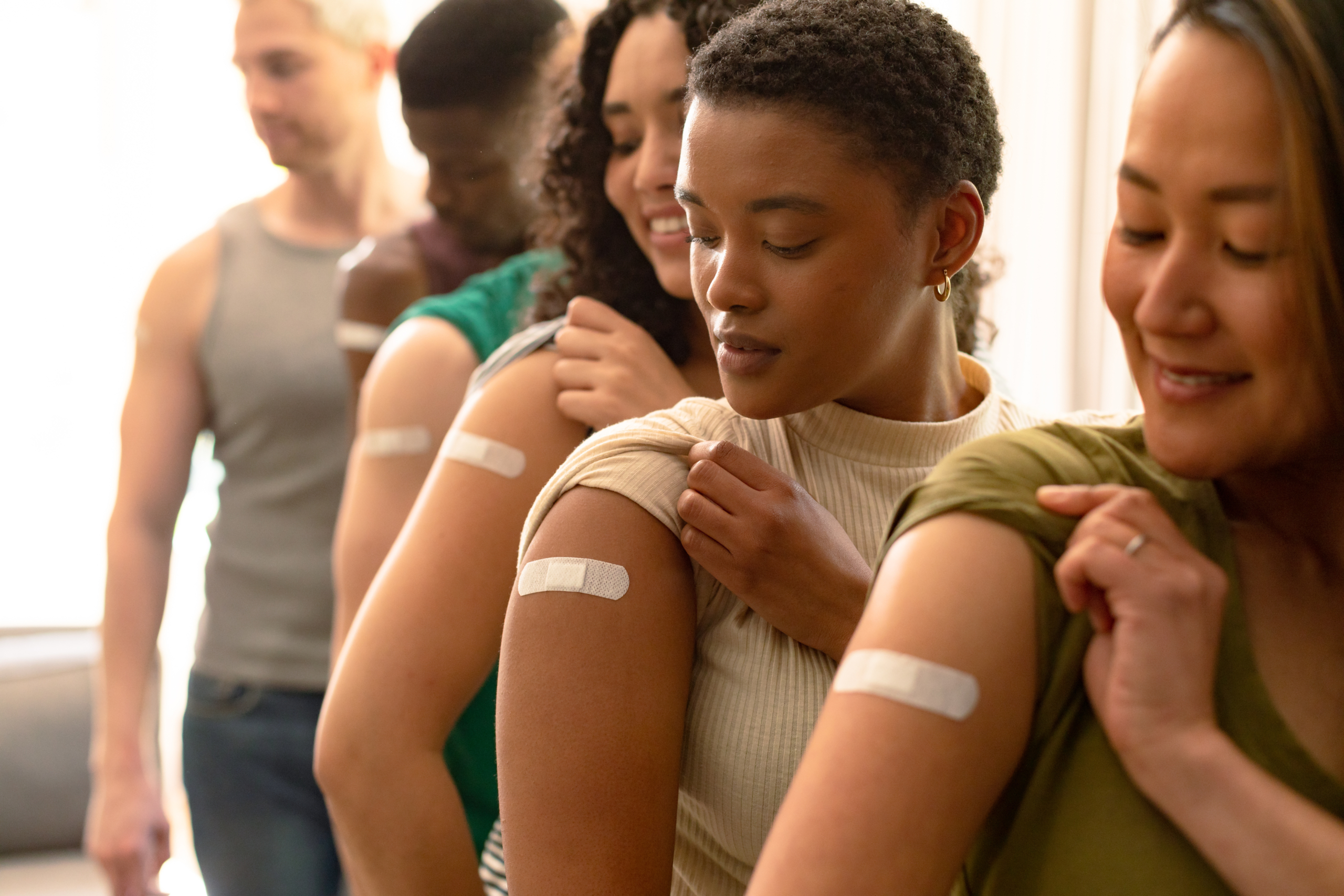Everything You Need to Know about Vaccines: How They Work, Are They Safe, and Which Ones Do You Need?
In 1900, three infectious diseases — diseases that are contagious and can be passed from one person to the next — made up almost one-third of all deaths.1 Those three infectious diseases were tuberculosis, pneumonia, and enteritis (infection of the intestines). And 30% of all deaths happened in children under five. The development of childhood vaccine programs later in the 1900s, along with other medical progress, led to a significant decline in the number of deaths from infectious diseases.1
Vaccines help protect us against certain infectious diseases, especially those that can lead to serious or long-term sickness, hospitalization, or death.2 Because infectious diseases can be passed between people, getting vaccinated not only helps protect you, but also helps protect your family, friends, local community, and even the global community.
How do vaccines work and why are they important?
Your immune system is designed to protect your body from strange substances, including germs like bacteria, viruses, and fungi. But sometimes your immune system needs help in order to protect you. Vaccines offer the help and support your immune system needs to fight off germs and infections.
Your immune system comes across a number of strange germs every day, and when it does, it sends different chemicals into your body to fight off these germs. This is called the immune response. But your immune system has to first come across the germ before it knows exactly how to respond. Vaccines help give your immune system a safe “preview” of a germ so that your immune system can “remember” that germ and be prepared to respond if it sees it again.3
DID YOU KNOW: Getting a vaccine doesn’t 100% guarantee that you won’t get sick with a certain infection, but it significantly lowers your risk of getting sick.4 In many cases, if you are vaccinated and do get sick, you are much less likely to get seriously ill or need to go to the hospital.
There are many different types of vaccines and they work in different ways:
- Inactivated vaccines5,6 – The germ in the vaccine is completely dead, so there is no risk that you can get sick with the disease from the vaccine. The protection from inactivated vaccines is not as strong as the protection from live vaccines, so you may need extra doses known as boosters in the future.
- Examples6: Hepatitis A, flu (the shot form), polio (the shot form), rabies
- Live, weakened vaccines5,6 – Also called live attenuated vaccines, the germ in this vaccine type is a weakened version of the actual germ. The protection live, weakened vaccines offer is stronger because the vaccines mimic the natural infection more closely. These rarely require a booster. One or 2 doses gives lifetime protection. Because there’s a small amount of the live, weakened virus, if you have a weak immune system due to taking certain medications, having autoimmune conditions, or having received an organ transplant, you may not be a good candidate for live, weakened vaccines.
- Examples6: measles/mumps/rubella, smallpox, chickenpox
- Subunit, conjugate, or recombinant vaccines5,6 – These vaccines use a specific, small piece of the germ, which provokes strong protection against the germ. Even still, you may need boosters for continued protection. Even people with weaker immune systems may be able to receive this type of vaccine.
- Examples6: Hepatitis B, pertussis (whooping cough), shingles, pneumococcal
- mRNA vaccines5,6 – mRNA vaccines make certain proteins that are similar to proteins the actual germ has in order to create an immune response in your body. There is no risk of getting the disease from an mRNA vaccine because the vaccine does not contain the germ itself.
- Example6: COVID-19
- Toxoid vaccines5,6 – Some germs release toxins, which cause disease. Toxoid vaccines use that toxin to create an immune response in the body. Toxoid vaccines require booster shots.
- Examples6: Diphtheria, tetanus
Vaccine Recommendations for 7 Important Infections
Flu
Scientific name: Influenza
Importance of the vaccine7: The flu — short for influenza — is caused by the influenza virus. Most people recover from the flu with no major complications, but infants, older people, people with chronic diseases, and people with weakened immune systems are more likely to have complications. The flu can be dangerous because it can cause secondary infections, meaning you can get another infection in addition to the flu.
Key vaccine recommendations: To protect vulnerable groups from getting sick from the flu, it’s recommended that everyone 6 months old or older get a flu vaccine every year.8 There are several different flu vaccines, including high-dose shots for older people whose immune systems need more help building up immunity.
Pneumonia
Scientific name: Pneumococcal disease
Importance of the vaccine9,10: Pneumococcal disease is any type of sickness the Streptococcus pneumoniae bacteria causes — for example:
- Pneumonia (infection of the lungs)
- Meningitis (infection around the brain and spinal cord)
- Middle ear infections
- Sepsis (infection of the blood)
Depending on the severity, pneumonia can require a person to be hospitalized and can even be fatal. Getting the pneumococcal vaccine is an effective way to lower your risk of developing pneumonia and other pneumococcal diseases.
Key vaccine recommendations: There are two different types of pneumococcal vaccines available in the US. The CDC recommends that people of all ages get some form of pneumococcal vaccine according to a specific schedule.11
COVID-19
Scientific name: COVID-19
Importance of the vaccine: The COVID-19 pandemic is an example of what can happen when a global population has no immunity (protection) against a certain germ — in this case, the novel coronavirus that began to spread in late 2019.12 Because this virus was new in humans, a worldwide lack of immunity led to a global pandemic. We quickly learned that COVID-19 could cause serious and possibly fatal complications, which made the development of a safe, effective vaccine groundbreaking.
Key vaccine recommendations: COVID-19 vaccines are recommended for everyone 6 months old and up, and updated boosters are also recommended.13
Chickenpox
Scientific name: Varicella
Importance of the vaccine: You might have childhood stories of getting chickenpox, staying home from school for a few weeks, bathing in oatmeal, and lathering up in calamine lotion. In many cases, chickenpox is a mild disease, but it’s also a highly contagious disease. For some people, like those with weaker immune systems or pregnant people, chickenpox could cause more serious issues.
Also, the varicella-zoster virus (VZV) that causes chickenpox never leaves your body.14 It merely “goes to sleep.” But later in life, it can “wake up” and cause shingles. This makes the chickenpox vaccine even more important, not only for preventing the spread of chickenpox but also to keep VZV from making a home in your body.
Key vaccine recommendations15: The CDC recommends children get a first dose of the chickenpox vaccine when they are between 12 and 15 months old, and a second dose when they’re between 4 and 6 years old. Combined, these two doses are about 90% effective at preventing chickenpox.
Shingles
Scientific name: Herpes zoster
Importance of the vaccine16: The same virus that causes chickenpox causes shingles. Shingles is often a much more painful infection than chickenpox is, causing a rash usually on one side of the body, the face, or the torso. The pain from the rash doesn’t always go away as soon as the rash does. Instead it can linger and turn into postherpetic neuralgia, a type of nerve pain. Getting the shingles vaccine helps keep you from getting shingles and developing postherpetic neuralgia.
Key vaccine recommendations17: There used to be a shingles vaccine called Zostavax, which you may have received. But a newer shingles vaccine called Shingrix has been developed and is much more effective at preventing shingles. It is now the only shingles vaccine available.
CDC recommends that adults 50 years old and up get two doses of the Shingrix vaccine, at least 2-6 months apart from each other. People aged 19 years and up are also eligible for the Shingrix vaccine. Even if you’ve had shingles before, had the chickenpox vaccine in the past, or had the Zostavax shingles vaccine in the past, getting Shingrix is still recommended.
DTaP, Tdap, DT, and Td
Scientific name: Diphtheria, tetanus, and pertussis (whooping cough)
Importance of the vaccine18,19: There are four variations of the vaccine that protects against diphtheria (a bacterial infection that causes severe inflammation) and tetanus (lockjaw). Two of these four — DTaP and Tdap — also help protect against whooping cough, a bacterial disease that can be especially dangerous for newborns and infants.
Key vaccine recommendations20: People of all ages should be vaccinated against diphtheria and tetanus. Babies and children who are less than 7 years old get the DTaP or DT vaccines. Between ages 11 and 12, it’s recommended for children to get a Tdap booster. And for adults, it’s recommended to get a Td or Tdap booster every 10 years.
Because of the danger of whooping cough to babies, it’s highly recommended that pregnant people get a whooping cough vaccine, as well as adults who’ve never had a whooping cough vaccine before.
HPV
Scientific name: Human papillomavirus
Importance of the vaccine: HPV is the number one cause of cervical cancer. In fact, HPV causes more than 95% of all cases of cervical cancer, and can cause other cancers too.21
Key vaccine recommendations22: Because HPV is a sexually transmitted infection, it’s recommended for children to get the HPV vaccine before becoming sexually active. The HPV vaccine can prevent more than 90% of cancers than HPV causes. By getting vaccinated early, parents can help make sure that their children are protected from the cancer-causing infection, before they are ever exposed to it.
It’s recommended that preteens between 11 and 12 years old get 2 doses of the HPV vaccine 6-12 months apart. If a person doesn’t get their first dose until later — between ages 15 and 26 — then 3 doses are recommended.
Where can I learn more about the vaccines I need or my family needs?
Vaccines help save lives and are important to staying healthy. Just like any other treatment, there is a risk of side effects. Most vaccine side effects are mild and the benefits of protecting yourself against an infectious disease usually outweigh possible side effects. In any case, talk to your doctor or pharmacist to learn more about:
- Whether you and your family are up to date on your vaccinations
- Whether there are any vaccines you shouldn’t get because of your medical history or medications you’re taking
- What the potential side effects are for specific vaccines
References:
- Achievements in Public Health, 1900-1999: Control of Infectious Diseases. MMWR. JUly 30, 1999. 48(29);621-629. https://www.cdc.gov/mmwr/preview/mmwrhtml/mm4829a1.htm
- Centers for Disease Control and Prevention. Vaccine-Preventable Adult Diseases. https://www.cdc.gov/vaccines/adults/vpd.html
- U.S. Department of Health & Human Services. Vaccines Protect You. https://www.hhs.gov/immunization/basics/work/prevention/index.html#:~:text=How%20do%20vaccines%20work%3F,the%20germ%20ever%20invades%20again.
- Centers for Disease Control and Prevention. Vaccine Safety: Overview, History, and How It Works. https://www.cdc.gov/vaccinesafety/ensuringsafety/history/index.html
- Centers for Disease Control and Prevention. Understanding How Vaccines Work. https://www.cdc.gov/vaccines/hcp/conversations/understanding-vacc-work.html
- U.S. Department of Health & Human Services. Vaccines Protect You. Vaccine Types. https://www.hhs.gov/immunization/basics/types/index.html
- Centers for Disease Control and Prevention. Flu Symptoms & Complications. https://www.cdc.gov/flu/symptoms/symptoms.htm
- Centers for Disease Control and Prevention. Flu (Influenza). https://www.cdc.gov/vaccines/vpd/flu/index.html
- Centers for Disease Control and Prevention. Pneumonia. https://www.cdc.gov/pneumonia/index.html
- Cleveland Clinic. Pneumonia. https://my.clevelandclinic.org/health/diseases/4471-pneumonia#symptoms-and-causes
- Centers for Disease Control and Prevention. Pneumococcal. https://www.cdc.gov/vaccines/vpd/pneumo/index.html
- World Health Organization. Coronavirus disease (COVID-19). https://www.who.int/health-topics/coronavirus
- Centers for Disease Control and Prevention. COVID-19: Stay Up to Date with Vaccines. https://www.cdc.gov/coronavirus/2019-ncov/vaccines/stay-up-to-date.html
- Centers for Disease Control and Prevention. Chickenpox (Varicella). https://www.cdc.gov/vaccines/vpd/varicella/index.html
- Centers for Disease Control and Prevention. Chickenpox Vaccination: What Everyone Should Know. https://www.cdc.gov/vaccines/vpd/varicella/public/index.html
- Centers for Disease Control and Prevention. Shingles. https://www.cdc.gov/vaccines/vpd/shingles/index.html
- Centers for Disease Control and Prevention. What Everyone Should Know about the Shingles Vaccine (Shingrix). https://www.cdc.gov/vaccines/vpd/shingles/public/shingrix/index.html
- Centers for Disease Control and Prevention. Diphtheria. https://www.cdc.gov/vaccines/vpd/diphtheria/index.html
- Centers for Disease Control and Prevention. Tetanus. https://www.cdc.gov/vaccines/vpd/tetanus/index.html
- Centers for Disease Control and Prevention. What Everyone Should Know. https://www.cdc.gov/vaccines/vpd/dtap-tdap-td/public/index.html
- World Health Organization. Cervical Cancer. https://www.who.int/news-room/fact-sheets/detail/cervical-cancer
Centers for Disease Control and Prevention. What Everyone Should Know. https://www.cdc.gov/vaccines/vpd/hpv/public/index.html
You Might Also Like:

What Our Community Is Saying About Mental Health
Recently, we reached out to our NOWINCLUDED community to ask a simple but important question: “What resources do you need to accomplish your mental health goals?” Here’s what we found.

Is Your “Waterproof” Sunscreen Lying to You? Unpacking the Truth About Sun Protection
As we slather on sunscreen, many of us reach for those bottles proudly proclaiming “waterproof” or “water resistant.” But have you ever stopped to wonder what those claims truly mean?






